#aushwitz
Text
LEGO System:
Concentration Camp
Set: 6772
1996
April Fools!!!

#fun fact this is a real thing#kinda#this is real but wasnt made by lego#it was made by the artist Zbigniew Libera#lego just blindly gave them the peaces to make it#april fools#tw nazis#tw nazi#trigger warning nazis#trigger warning nazi#tw ww2#trigger warning ww2#trigger warning concentration camps#tw concentration camp#tw auschwitz#trigger warning aushwitz#tw war#tw implied death#tw death#tw murder#lego#lego builds#lego sets#aushwitz#lego system#lego concentration camp
1 note
·
View note
Text
Victims of the Holocaust
I had the chance to take part in a life changing and wide opening experience- Lessons from Auschwitz.
I had obviously heard about the holocaust before, as well as many of the people reading this. However, visiting the site in Poland, learning the stories of victims and survivors has been immeasurable to what i thought i known.
I'm going to take you through this blog of just a pinch of what i learned and hope that you too, remember the holocaust and most importantly, the victims we lost and remembering the few we have today. They were people.
The Holocaust has many definitions and each are correct in their own ways. Overall it was the murder of approximately 6 million Jewish men, women and children by Nazi Germany and its collaborators during the Second Word War.
It was just Hitler, or the Nazi soldiers or the people driving the train, Nazi Germany population or those who knew and stayed silent. It was all of them together.
Many people forget that there was a pre-war Jewish life. Myself included before this project.
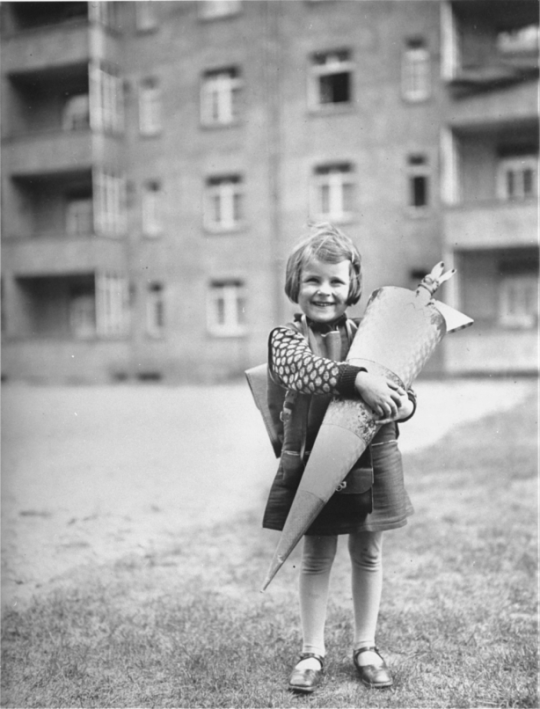
This is Berta Rosenhein, 6 at the time. She is carrying a 'Shultute' which is a tradition is many Eastern European such as Germany (as pictured) filled with sweets and toys for their first day of school. Berta was Jewish. And had a life before the holocaust just like everyone else.
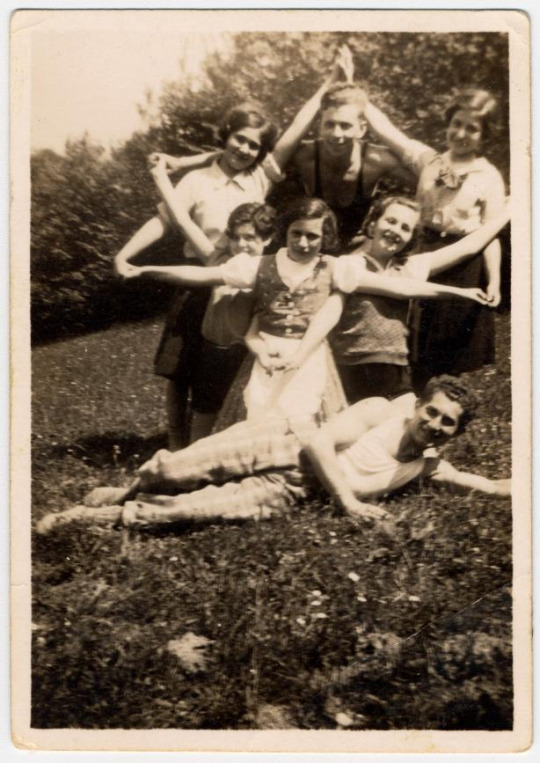
This is a group of kids taken in 1930 Zagreb, Croatia. They was apart of a youth Zionist group and themselves were also Jewish.
Actually visiting the Holocaust was a whole different experience. I could never understand the pain in which they endured however actually visiting Auschwitz Birkenau was a small glimpse into their world at the time. There was two camps. The first being mainly a museum of the artifacts left over from the Holocaust such as these listed below:

Many Jewish people were Kosher (dietary) so had many different pots and pans for their food. They thought they was coming for a nice time and that they could cook and practice their Jewish laws.
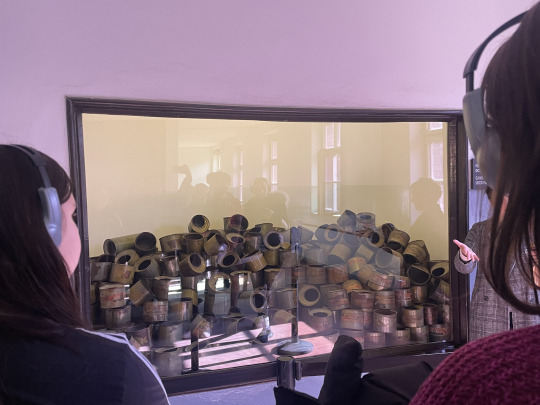
This photograph here shows what the containers of Zyklon B in which the Nazis taken the lifes of Jewish people with.
Many other pictures are very disturbing as they show personal belongings and items of the Jewish victims which deserve to be seen in real life and in the moment. It is extremely raw and touching, seeing this in real life rather than over images. I can only hope with this blog to show this.
It needs to be known that it wasn't only Jewish people in these camps but also Catholic Polish, disabled people, soviet soldiers, Romany Gypsies and more.
The second camp is many you will see in textbooks and films. Much of this camp was where many of the gas chambers were.

It was vast and wide, surrounded by trees. Freezing in the winter and exhausting in the summer. This is where the trains would pull in and where many people were faced with the cold reality of this trip they though they was having. Real people and real emotions. They had dreams and families and a life. They had what little of their religion they had left to push them through and to live to bear witness to what they have been put through.
What many people confuse with, and myself included was that the commanders and the Nazis were inhumane monsters. They too were people with families, many of their families lived next door to the camps. They were people who were living a life and crossing a gate to these camps of lifeless faces.
We need to stop seeing the bigger picture and actually take notice of personal stories of these victims and realise that this could happen at any time. It can only take one person to brainwash others to make them believe extreme and disturbing views. We can prevent this from happening again. And we can keep on informing people of the holocaust and it's victims too.
3 notes
·
View notes
Text
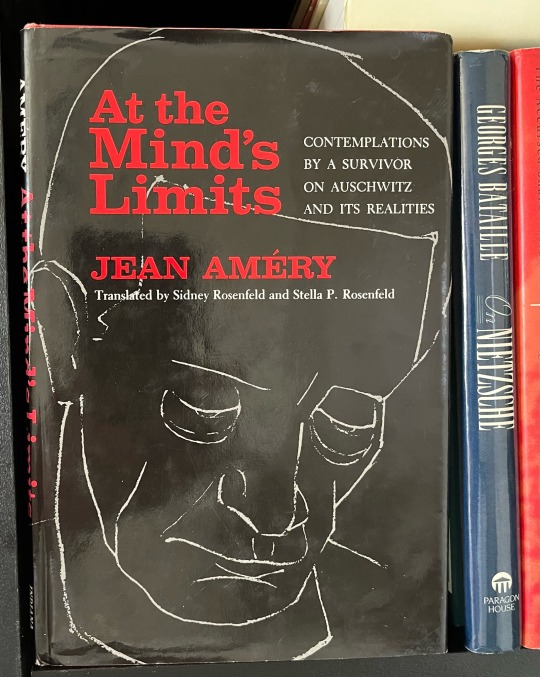
“What, for example, was the attitude of the intellectual in Auschwitz toward death? A vast, unsurveyable topic, which can be covered here only fleetingly, in double time! I will assume it is known that the camp inmate did not live next door to, but in the same room with death. Death was omnipresent. The selections for the gas chambers took place at regular intervals. For a trifle prisoners were hanged on the roll call grounds, and to the beat of light march music their comrades had to file past the bodies - Eyes right! - that dangled from the gallows. Prisoners died by the score, at the work site, in the infirmary, in the bunker, within the block. I recall times when I climbed heedlessly over piled-up corpses and all of us were too weak or too indifferent even to drag the dead out of the barracks into the open. But as I have said, people have already heard far too much about this; it belongs to the category of the horrors mentioned at the outset, those which I was advised with good intentions not to discuss in detail.
Here and there someone will perhaps object that the front-line soldier was also constantly surrounded by death and that therefore death in the camp actually had no specific character and posed no incomparable ques: tions. Must I even say that the analogy is false? Just as the life of the front-line soldier, however he may have suffered at times, cannot be compared with that of the camp inmate, death in battle and the prisoner's death are two incommensurables. The soldier died the hero's or victim's death, the prisoner that of an animal intended for slaughter. The soldier was driven into the fire, and it is true that his life was not worth much. Still, the state did not order him to die, but to survive. The final duty of the prisoner, however, was death. The decisive difference lay in the fact that the front-line soldier, unlike the camp inmate, was not only the target, but also the bearer of death. Figuratively expressed: death was not only the ax that fell upon him, but it was also the sword in his hand. Even while he was suffering death, he was able to inflict it. Death approached him from without, as his fate, but it also forced its way from inside him as his own will. For him death was both a threat and an opportunity, while for the prisoner it assumed the form of a mathematically determined solution: the Final Solution! These were the conditions under which the intellectual collided with death. Death lay before him, and in him the spirit was still stirring; the latter confronted the former and tried - in vain, to say it straight off - to exemplify its dignity.
The first result was always the total collapse of the esthetic view of death. What I am saying is familiar. The intellectual, and especially the intellectual of German education and culture, bears this esthetic view of death within him. It was his legacy from the distant past, at the very latest from the time of German romanticism. It can be more or less characterized by the names Novalis, Schopenhauer, Wagner, and Thomas Mann. For death in its literary, philosophic, or musical form there was no place in Auschwitz. No bridge led from death in Auschwitz to Death in Venice. Every poetic evocation of death became intolerable, whether it was Hesse's "Dear Brother Death" or that of Rilke, who sang: "Oh Lord, give each his own death." The esthetic view of death had revealed itself to the intellectual as part of an esthetic mode of life; where the latter had been all but forgotten, the former was nothing but an elegant trifle. In the camp no Tristan music accompanied death, only the roaring of the SS and the Kapos. Since in the social sense the death of a human being was an occurrence that one merely registered in the so-called Political Section of the camp with the set phrase "subtraction due to death," it finally lost so much of its specific content that for the one expecting it, its esthetic embellishment in a way became a brazen demand and, in regard to his comrades, an indecent one.
After the esthetic view of death crumbled, the intellectual faced death defenselessly. If he attempted nonetheless to establish an intellectual and metaphysical relationship to it, he ran up against the reality of the camp, which doomed such an attempt to failure. How did it work in practice? To put it briefly and tritely: just like his unintellectual comrade, the intellectual inmate did not occupy himself with death, but with dying. Then, however, the entire problem was reduced to a number of concrete considerations. For example, there was once a conversation in the camp about an SS man who had slit open a prisoner's belly and filled it with sand. It is obvious that in view of such possibilities one was hardly concerned with whether, or that, one had to die, but only with how it would happen. Inmates carried on conversations about how long it probably takes for the gas in the gas chamber to do its job. One speculated on the painfulness of death by phenol injections. Were you to wish yourself a blow to the skull or a slow death through exhaustion in the infirmary? It was characteristic for the situation of the prisoner in regard to death that only a few decided to "run to the wire," as one said, that is, to commit suicide through contact with the highly electrified barbed wire. The wire was after all a good and rather certain thing, but it was possible that in the attempt to approach it one would be caught first and thrown into the bunker, and that led to a more difficult and more painful dying. Dying was omnipresent, death vanished from sight.
Now of course, no matter where you are, the fear of death is essentially the fear of dying, and Franz Borkenau's claim that the fear of death is the fear of suffocation holds true also for the camp. For all that, if one is free it is possible to entertain thoughts of death that at the same time are not also thoughts of dying, fears of dying. Death in freedom, at least in principle, can be intellectually detached from dying: socially, by infusing it with thoughts of the family that remains behind, of the profession one leaves, and mentally, through the effort, while still being, to feel a whiff of Nothingness. It goes without saying that such an attempt leads nowhere, that death's contradiction cannot be resolved. Still, the effort contains its own intrinsic dignity: the free person can assume a certain spiritual posture toward death, because for him death is not totally absorbed into the torment of dying. The free person can venture to the out most limit of thought, because within him there is still a space, however tiny, that is without fear. For the prisoner, however, death had no sting, not one that hurts, not one that stimulates you to think. Perhaps this explains why the camp inmate and it applies equally to the intellectual as well as to the unintellectual did experience agonizing fear of certain kinds of dying, but scarcely an actual fear of death. If I may speak of myself, then let me assert here that I never considered myself to be especially brave and probably also am not. Yet, when they once fetched me from my cell after I already had a few months of punitive camp behind me and the SS man gave me the friendly assurance that now I was to be shot, I accepted it with perfect equanimity. "Now you're afraid, aren't you?" the man - who was just having fun - said to me. "Yes," I answered, but more out of complaisance and in order not to provoke him to acts of brutality by disappointing his expectations. No, we were not afraid of death. I clearly recall how comrades in whose blocks selections for the gas chambers were expected did not talk about it, while with every sign of fear and hope they did talk about the consistency of the soup that was to be dispensed. The reality of the camp triumphed effortlessly over death and over the entire complex of the so-called ultimate questions. Here, too, the mind came up against its limits.
All those problems that one designates according to a linguistic convention as "metaphysical" became meaningless. But it was not apathy that made contemplating them impossible; on the contrary, it was the cruel sharpness of an intellect honed and hardened by camp reality. In addition, the emotional powers were lacking with which, if need be, one could have invested vague philosophic concepts and thereby made them subjectively and psychologically meaningful. Occasionally, perhaps that disquieting magus from Alemannic regions came to mind who said that beings appear to us only in the light of Being, but that man forgot Being by fixing on beings. Well now, Being. But in the camp it was more convincingly apparent than on the outside that beings and the light of Being get you nowhere. You could be hungry, be tired, be sick. To say that one purely and simply is, made no sense. And existence as such, to top it off, became definitively a totally abstract and thus empty concept. To reach out beyond concrete reality with words became before our very eyes a game that was not only worthless and an impermissible luxury but also mocking and evil. Hourly, the physical world delivered proof that its insufferableness could be coped with only through means inherent in that world. In other words: nowhere else in the world did reality have as much effective power as in the camp, nowhere else was reality so real. In no other place did the attempt to transcend it prove so hopeless and so shoddy. Like the lyric stanza about the silently standing walls and the flags clanking in the wind, the philosophic declarations also lost their transcendency and then and there became in part objective observations, in part dull chatter. Where they still meant something they appeared trivial, and where they were not trivial they no longer meant anything. We didn't require any semantic analysis or logical syntax to recognize this. A glance at the watchtowers, a sniff of burnt fat from the crematories sufficed.” (pages 15 - 19)
#amery#améry#jean amery#jean améry#at the mind’s limits#aushwitz#naziism#wwii#holocaust#bataille#georges bataille#nietzsche#books#bookshelf#library
2 notes
·
View notes
Text
Watch "Inmate 4859 – Witold Pilecki – Sabaton History 042 [Official]" on YouTube
youtube
2 notes
·
View notes
Text

4 notes
·
View notes
Text
FLORIDIA: LA “Passio” LANGLOIS “UN TESTO DURO, INTENSO VERO”
disse il compianto Sebastiano Lo Monaco, durante l’indimenticabile “Bella Passione” portata in scena nel 2017
Sulle note di Antonio Granata, riecheggia ancora, una serata memorabile ricreata dallo scritto del misticoLanglois, il prete che non si spaventava di una penna.
“Rompi il tuo silenzio, dimmi chi sei”. L’incipit della possente voce di Sebastiano scuote ancora le…

View On WordPress
#2017#2minuti#abuso#amore#Antonio Granata#Aushwitz#bella passione#carne#chiesa di sant&039;anna#coscienza#crocefiggilo#Cultura#eredità#essere umano#Floridia#Folies Bergère#folla#gesú#il maestro#il mstero#il prete#inda#indimenticabile#innocente#la passio di langlois#largo#mesto#minaccia#mistico#Musica
0 notes
Text
If This Is A Man by Primo Levi from 1947 for today
26 February 1944 | A transport of 650 Italian Jews arrived at Auschwitz from Fossoli di Carpi. 526 people were murdered in gas chambers. 29 women & 95 men were registered in the camp. Among them was Primo Levi – he received number 174517. In September 1947 he wrote “If This is a Man”.
“You who live safeIn your warm houses,You who find, returning in the evening,Hot food and friendly faces:Consider…

View On WordPress
0 notes
Photo

Never Again // For #internationalholocaustremembranceday 💔 • • #MBS #poem #poetry #poetsofinstagram #poetrycommunity #poetsofig #neveragain #holocaustremembranceday #aushwitz #writer #writingcommunity #writing #writerscommunity #writersofinstagram #writtenword #spilledink #spilledthoughts #instapoet #instapoetry https://www.instagram.com/p/Cn7LhqIudvf/?igshid=NGJjMDIxMWI=
#internationalholocaustremembranceday#mbs#poem#poetry#poetsofinstagram#poetrycommunity#poetsofig#neveragain#holocaustremembranceday#aushwitz#writer#writingcommunity#writing#writerscommunity#writersofinstagram#writtenword#spilledink#spilledthoughts#instapoet#instapoetry
1 note
·
View note
Photo

We staying in the #jewishghetto while in Rome. There were placards in front of doors remembering the Jewish people who were arrested and eventually killed (most of the at #aushwitz). The mid 1940s in this neighborhood must have been horrifying. We arrived at our flat about 1:00 AM. The directions said go up the stairs and it’s first door on the right. What we didn’t understand is that you go up TWO flights of stairs. So I tried the door and heard something in Italian. We had the wrong room. We found it by climbing another set of stairs. I came back down a little later to find something open with a snack, and an old Jewish Italian man was standing at the door. We had this conversation: Me: I am so sorry. We had the wrong room. Him: Oh Okay. I heard and it scared me! Me: I’m very sorry. Him: Its okay, okay. Me: Thanks for understanding we’re staying upstairs. Him: Ahh — enjoy Italy. Here’s the button you need to open the outside door as you leave. Me. That’s great! Thanks! He spoke no English. I spoke no Italian. We had a moment of human communication. Humanizing people of all cultures is how we keep nazis and holocausts from ever happening again. (at Ghetto di Roma) https://www.instagram.com/p/CinWYO_jrGa/?igshid=NGJjMDIxMWI=
0 notes
Photo

Auguri Liliana!!! Un donna una Pagina di storia x non dimenticare 🙏❤️🙏 #lilianasegre #shoa #aushwitz #olocaustao #peaceandlove #forever https://www.instagram.com/p/CiV6uAxDuC7/?igshid=NGJjMDIxMWI=
0 notes
Photo
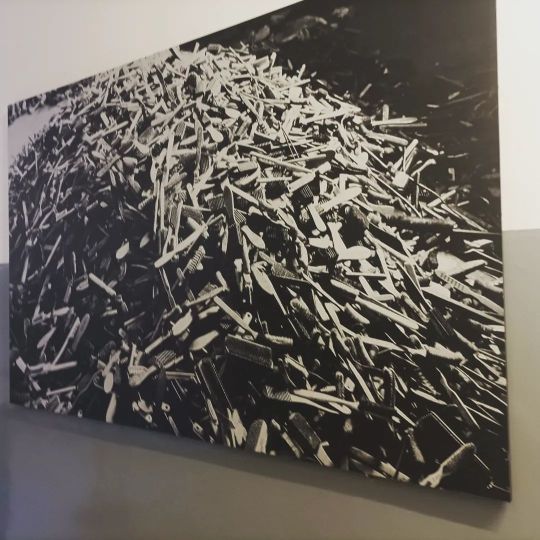
„Pamietam bo to część mojej historii Pamiętam bo to część mojego kraju Niechlubna prawda, która nas kształtuje” Pamiętacie jak mówiłam, że ludzie podpisywali walizki? Myśleli, że tak łatwiej będzie je odszukać nie sądzili, że tych rzeczy już nie odzyskają. To co najcenniejsze SS pokradło, a reszta była do wyrzucenia. Tony ubrań, butów, walizek, sprzętów medycznych tj. ortezy, wózki oraz tony grzebieni, garnków czy innych drobiazgów. Część tych rzeczy jest zachowana w gablotach i to są pamiątki niechlubnej historii tego kraju, pamiątki po ludziach, których już nie ma. Przeczytałam ostanio, że zmarł właśnie ostatni żyjący z pierwszego transportu do obozu, a niedługo nie będzie nikogo, by ta historię mógł przekazać. Jedynym namacalnym dowodem, pamięcią o tragedii będą stanowić rzeczy. W tym budynku mieści się też sala, która ma zakaz fotografowania i nie dziwię się, bo. W tej sali jest coś gorszego niż drobiazgi, a są to włosy ofiar. Włosy wywożono do fabryk, a to są ocalałe, których nie zdążono wywieźć i odnaleziono je po wyzwoleniu. Ta sala była jedną z najgorszych. Tajemnica nie był fakt, że obóz istniał tylko kto go założył i po co. Większąść osób na zewnątrz nie miała pojęcia o tym miejscu, ani o tym co tam się dzieje. Nawet do ostatniej sekundy nie mieli pojęcia o tym co ich czeka. Wchodzili do przebieralni, a potem do sali z prysznicami myśląc, że chodzi o kąpiel i dopiero kiedy robił się ścisk podejrzewali, że jest coś nie tak. Miłego wieczoru kochani! 😉 #historia #tragedia #dramat #death #oświęcim #okupacja #więźniowie #Aushwitz #Birkenau #ofiary #rzeczy #night #Thursday (w: Auschwitz Memorial / Muzeum Auschwitz) https://www.instagram.com/p/CiQu9HOMtZV/?igshid=NGJjMDIxMWI=
#historia#tragedia#dramat#death#oświęcim#okupacja#więźniowie#aushwitz#birkenau#ofiary#rzeczy#night#thursday
0 notes
Text
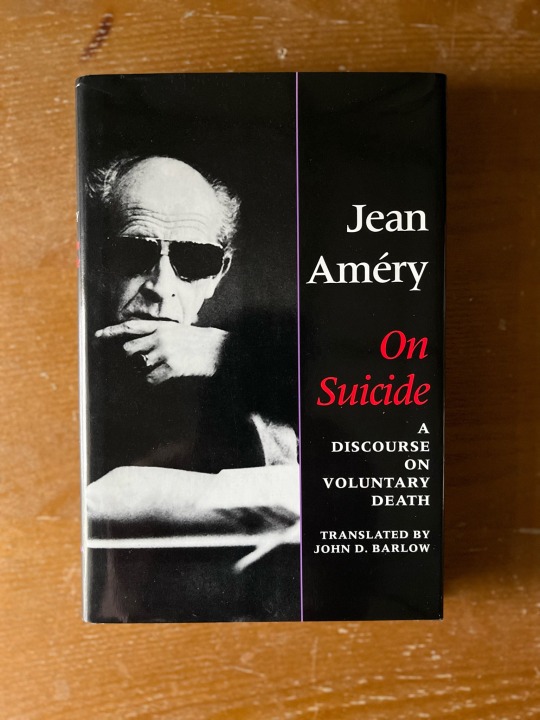
“Someone who sets about to try to grasp the idea of voluntary death, even if only for an hour, even if only flirtatiously and playfully, will only poorly understand society's obtrusive solicitude for his final fate. It has, this society, never troubled itself very much about his existence and what it is like. War is concocted: he will be called up and charged with proving his worth in the midst of blood and iron. Society took his work from him after it raised him for it: now he is unemployed, he is sent packing with alms that he consumes as he consumes himself with them. He gets sick: but unfortunately there are not enough hospital beds, the expensive palliatives are rare and the most expensive of all, a single room, is not made available to him. Not until now, when he wishes to give in to the inclination toward death, when he is no longer willing to offer any resistance to his disgust with being, when dignity and humanity order him to dispose of the matter neatly and to achieve what he one day will have to achieve anyway: to disappear - only now does society behave as if he were its most precious part and surround him with hideous equipment, parading before him the highly repulsive occupational ambition of physicians who can then ascribe his "rescue" to the credit side of their professional account like hunters when they pace off the spot where their game was slaughtered. In their opinion, they have retrieved him from death and they behave like sportsmen who have succeeded in an extraordinary achievement.
No doubt, there's something funny about this. I mean on the one hand the cold indifference society displays toward individual human beings and its heated-up care for one of them who wants to step voluntarily out of association with the living. Is each person its property? Here and there I have already rejected by implication the demand society makes on those ready for death. Here the question needs to be asked once again and then answered: To whom does a human being belong?” (pages 93, 94)
“It has to be said right away that the claim of religion on the individual human being, as soon as we establish the relationship to voluntary death, is of the same nature as the demand of society: neither the latter nor the former permit one the freedom to decide how to deal with what one possesses in fact and law. Both demand of individuals (and just think here of Kant who, as a consequence of his categorical idea of duty, rejected voluntary death just as much as any little village pastor or great theologian) that they relinquish their freedom of choice: not voluntarily, but in obedience to a duty to God or to humanity. The religious hold on human beings is nothing other than the expression of a hold that is social and, if in former times the churches denied Christian burial to suicides, their actions were no different from those of primitive tribes for whom the cadaver of a suicide is in possession of something unclean that has to be removed from the living as quickly as possible in order to stave off evil spirits. But even those social units that tolerate suicide, and under circumstances even make it a duty, such as the more tightly knit social organization of the Japanese warrior caste, understand it as a social phenomenon and interpret it in the sense of preserving the species or the continuation of the social organization in question. As far as I can see, voluntary death - with the quantitatively negligible exceptions of philosophical schools or philosophizing individuals (Epicurus, Seneca, Diderot) - is nowhere recognized for what it is: a precisely free and voluntary death and a highly individual matter that, to be sure, is never carried out without social reference, with which however and finally human beings are alone with themselves, before which society has to be silent.” (pages 96, 97)
5 notes
·
View notes
Photo

“Those who cannot remember the past are condemned to repeat it” -George Santayana- #netherlands #dodenherdenking #4mei #remember #historyrepeatsitself #ukraine #dontlookaway #aushwitz https://www.instagram.com/p/CdJajpOKp3A/?igshid=NGJjMDIxMWI=
1 note
·
View note
Text


JONAH HAUER-KING for GQ MAGAZINE UK
It's my first big – like really big – movie and it's so exciting. I've had a few years to process how big this movie might be, as I actually started preparing for it back in April 2019. Four long years of production, which was halted by Covid, and now we're finally releasing it to the world. It's pretty daunting 👑
#jonah hauer king#jhk#the little mermaid#tlm#halle bailey#world on fire#the song of names#old boys#little women 2017#gq magazine#protect him at all costs#real king!#the tatooist of aushwitz
45 notes
·
View notes
Text
You know the german schoolsystem did you a solid one when you watch the 2022 remake of "all quiet on the western front" and your first response is to go get a bucket to puke in because of how disgusted you are at just the speech of that one guy at the beginning, telling all these poor boys that they'd be glorious heroes in war, knowing fully well that only one of them at most will make it back alive. Can't believe that there are people who saw this movie and still think that there is any kind of glory in war, in killing for the sake of someone that doesn't even know you exist until the moment he has to sign the papers so your family can be notified of your death and claim the survivors benefits and not even that is guaranteed seeing how many people are still considered "missing" from all the wars with no confirmation of death.
Edit bc I have some more thoughts and wanna add stuff in general:
btw I've all seen the two previous versions of the movie in history class and read the book in my own free time and if you have an interest in german history and can sit through several different iterations of the same story then I'd really advise you to watch all of them. I don't remember much of the black and white version bc my adhd brain decided to eat a hole into my memory but the first colour variant has a very different ending to the 2022 version that can be some great food for thought. My countries history is most certainly not the best and most bedazzeled but it's im portant to learn about it, especially the really ugly parts, and not repeat the same mistakes and pretend like it never happend (looking right at the peeps over in north america who want to be all hush hush about slavery, strategic massmurder of the natives and warcrimes in the east and take black history out of school, I see you, stop it).
Also idk if there is an english translation out, but if you are also interested in learning about WW2 from the perspective of an actual KZ inmate I'd recommend you take a look into "Der Fotograf von Auschwitz" it's a book written about the very real experiences of Whilhem Brasse who was sent to the camp at the age of 22 and then forced to be the photographer at the camp, taking pictures of the inamtes for dokumentation or just for the shits and giggles of the guards and officers. The book featured photos that Brasse took in his time in the camp as well as detailed explanations for terms and practices, it was first published in 2007, but then republlished in 2014, two years after Wilhelm Brasse passed away in 2012, to honor him and the bravery he has shwon all throughout his life and the service he has done to all of us by sharing his experiences.
I really like both of these books, even though they cover two completely different eras in the history of germany and one of them is fiction while the other is a retelling of a persons life. Fiction or not, both of these sources portray the horrors of the individual periods very real, bare without excuses and close to comprehensible, though I don't think I'll ever be able to fully comprehend or understand what the people back then had gone through simply because I didn't live through it myself and I pray that I'll never have to. There are many people out there who are suffering in similiar situations right this moment, be it in the chinese torturecamps for the Uyghur people to force them into conformity or the all the brave ukranians and volunteers from other countries who fight for their home, history and families in a war against a tyran that claims to be the victim while sitting on a stash of atomic warheads. It's for those people that we have to be taught about these crimes of the past, so we can recognize them in the future and take them on informed, prepared and head first.
#random#wiika#all quiet on the western front#im westen nichts neues#sorry for getting all political#just makes me feel some big emotions and have some big opinions#this movie made me throw up a bunch#idk why it just got to me more than violence and gore usually does#and honestly in the given context I think that's a good thing#der fotograf von aushwitz#it's a really good read I promise#I'm done with expanding on this post now
122 notes
·
View notes
Text
“She closes her eyes and tries to recall what the world was like when there was no fear”
The librarian of Aushwitz by Antonio Iturbe.

#book quotes#book#book lover#love quotes#libroadicta#love books#amor a los libros#auschwitz#librarians#The librarian of Aushwitz#Antonio iturbe
5 notes
·
View notes